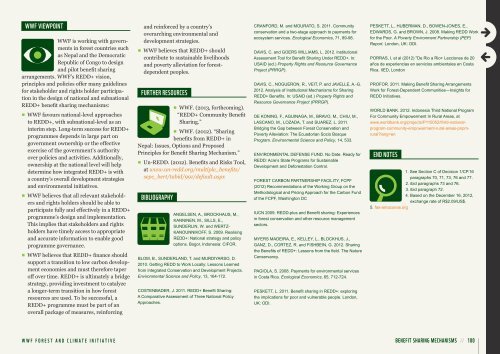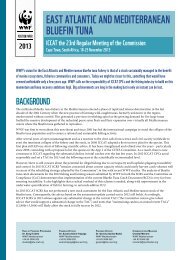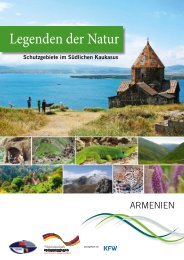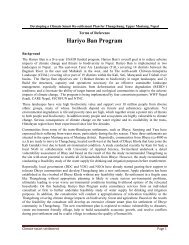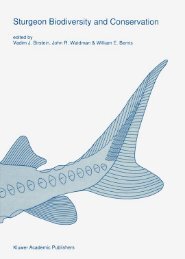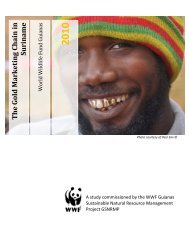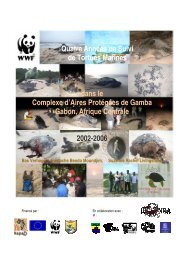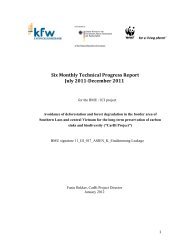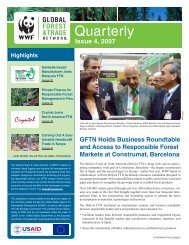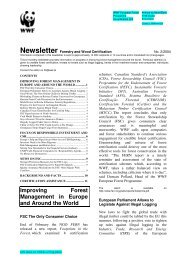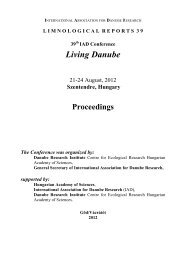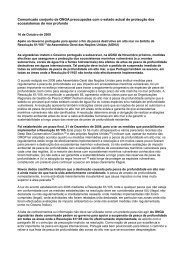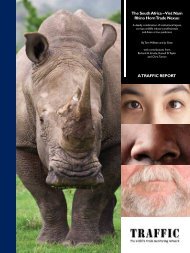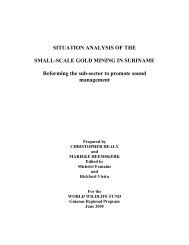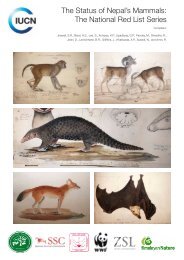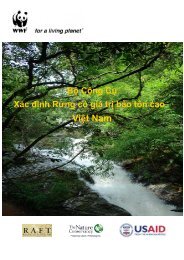WWF Guide to Building REDD+ Strategies
WWF Guide to Building REDD+ Strategies
WWF Guide to Building REDD+ Strategies
You also want an ePaper? Increase the reach of your titles
YUMPU automatically turns print PDFs into web optimized ePapers that Google loves.
<strong>WWF</strong> vieWPoint<br />
<strong>WWF</strong> is working with governments<br />
in forest countries such<br />
as Nepal and the Democratic<br />
Republic of Congo <strong>to</strong> design<br />
and pilot benefit sharing<br />
arrangements. <strong>WWF</strong>’s <strong>REDD+</strong> vision,<br />
principles and policies offer many guidelines<br />
for stakeholder and rights holder participation<br />
in the design of national and subnational<br />
<strong>REDD+</strong> benefit sharing mechanisms:<br />
n <strong>WWF</strong> favours national-level approaches<br />
<strong>to</strong> <strong>REDD+</strong>, with subnational-level as an<br />
interim step. Long-term success for <strong>REDD+</strong><br />
programmes depends in large part on<br />
government ownership or the effective<br />
exercise of the government’s authority<br />
over policies and activities. Additionally,<br />
ownership at the national level will help<br />
determine how integrated <strong>REDD+</strong> is with<br />
a country’s overall development strategies<br />
and environmental initiatives.<br />
n <strong>WWF</strong> believes that all relevant stakeholders<br />
and rights holders should be able <strong>to</strong><br />
participate fully and effectively in a <strong>REDD+</strong><br />
programme’s design and implementation.<br />
This implies that stakeholders and rights<br />
holders have timely access <strong>to</strong> appropriate<br />
and accurate information <strong>to</strong> enable good<br />
programme governance.<br />
n <strong>WWF</strong> believes that <strong>REDD+</strong> finance should<br />
support a transition <strong>to</strong> low carbon development<br />
economies and must therefore taper<br />
off over time. <strong>REDD+</strong> is ultimately a bridge<br />
strategy, providing investment <strong>to</strong> catalyze<br />
a longer-term transition in how forest<br />
resources are used. To be successful, a<br />
<strong>REDD+</strong> programme must be part of an<br />
overall package of measures, reinforcing<br />
and reinforced by a country’s<br />
overarching environmental and<br />
development strategies.<br />
n <strong>WWF</strong> believes that <strong>REDD+</strong> should<br />
contribute <strong>to</strong> sustainable livelihoods<br />
and poverty alleviation for forest-<br />
dependent peoples.<br />
FuRtHeR ReSouRCeS<br />
n <strong>WWF</strong>. (2013, forthcoming).<br />
“<strong>REDD+</strong> Community Benefit<br />
Sharing.”<br />
n <strong>WWF</strong>. (2012). “Sharing<br />
benefits from <strong>REDD+</strong> in<br />
Nepal: Issues, Options and Proposed<br />
Principles for Benefit Sharing Mechanism.”<br />
n Un-REDD. (2012). Benefits and Risks Tool,<br />
at www.un-redd.org/multiple_benefits/<br />
sepc_bert/tabid/991/default.aspx<br />
BiBlioGRaPHy<br />
ANGELSEN, A., BROCKHAUS, M.,<br />
KANNINEN, M., SILLS, E.,<br />
SUNDERLIN, W. and WERTZ-<br />
KANOUNNIKOFF, S. 2009. Realising<br />
<strong>REDD+</strong>: National strategy and policy<br />
options. Bogor, Indonesia: CIFOR.<br />
BLOM, B., SUNDERLAND, T. and MURDIyARSO, D.<br />
2010. Getting REDD <strong>to</strong> Work Locally: Lessons Learned<br />
from Integrated Conservation and Development Projects.<br />
Environmental Science and Policy, 13, 164-172.<br />
COSTENBADER, J. 2011. <strong>REDD+</strong> Benefit Sharing:<br />
A Comparative Assessment of Three National Policy<br />
Approaches.<br />
CRANFORD, M. and MOURATO, S. 2011. Community<br />
conservation and a two-stage approach <strong>to</strong> payments for<br />
ecosystem services. Ecological Economics, 71, 89-98.<br />
DAVIS, C. and GOERS WILLIAMS, L. 2012. Institutional<br />
Assessment Tool for Benefit Sharing Under <strong>REDD+</strong>. In:<br />
USAID (ed.) Property Rights and Resource Governance<br />
Project (PRRGP).<br />
DAVIS, C., NOGUERON, R., VEIT, P. and JAVELLE, A.-G.<br />
2012. Analysis of Institutional Mechanisms for Sharing<br />
<strong>REDD+</strong> Benefits. In: USAID (ed.) Property Rights and<br />
Resource Governance Project (PRRGP).<br />
DE KONING, F., AGUINAGA, M., BRAVO, M., CHIU, M.,<br />
LASCANO, M., LOZADA, T. and SUAREZ, L. 2011.<br />
Bridging the Gap between Forest Conservation and<br />
Poverty Alleviation: The Ecuadorian Socio Bosque<br />
Program. Environmental Science and Policy, 14, 533.<br />
ENVIRONMENTAL DEFENSE FUND. No Date. Ready for<br />
REDD: Acre’s State Programs for Sustainable<br />
Development and Deforestation Control.<br />
FOREST CARBON PARTNERSHIP FACILITy, FCPF<br />
(2012) Recommendations of the Working Group on the<br />
Methodological and Pricing Approach for the Carbon Fund<br />
of the FCPF, Washing<strong>to</strong>n DC<br />
IUCN 2009. REDD-plus and Benefit sharing: Experiences<br />
in forest conservation and other resource management<br />
sec<strong>to</strong>rs.<br />
MyERS MADEIRA, E., KELLEy, L., BLOCKHUS, J.,<br />
GANZ, D., CORTEZ, R. and FISHBEIN, G. 2012. Sharing<br />
the Benefits of <strong>REDD+</strong>: Lessons from the field. The Nature<br />
Conservancy.<br />
PAGIOLA, S. 2008. Payments for environmental services<br />
in Costa Rica. Ecological Economics, 65, 712-724.<br />
PESKETT, L. 2011. Benefit sharing in <strong>REDD+</strong>: exploring<br />
the implications for poor and vulnerable people. London,<br />
UK: ODI.<br />
PESKETT, L., HUBERMAN, D., BOWEN-JONES, E.,<br />
EDWARDS, G. and BROWN, J. 2008. Making REDD Work<br />
for the Poor. A Poverty Environment Partnership (PEP)<br />
Report. London, UK: ODI.<br />
PORRAS, I, et al (2012) "De Rio a Rio+ Lecciones de 20<br />
años de experiencias en servicios ambientales en Costa<br />
Rica. IIED, London<br />
PROFOR. 2011. Making Benefit Sharing Arrangements<br />
Work for Forest-Dependent Communities—Insights for<br />
REDD Initiatives.<br />
WORLD BANK. 2012. Indonesia Third National Program<br />
For Community Empowerment In Rural Areas, at<br />
www.worldbank.org/projects/P115052/third-national-<br />
program-community-empowerment-rural-areas-pnpmrural?lang=en<br />
end noteS<br />
1. See Section C of Decision 1/CP.16<br />
paragraphs 70, 71, 73, 76 and 77.<br />
2. ibid paragraphs 73 and 76.<br />
3. ibid paragraph 72.<br />
4. Based on the December 16, 2012,<br />
exchange rate of R$2.09/US$.<br />
5. fas-amazonas.org<br />
<strong>WWF</strong> FOREST AND CLIMATE INITIATIVE BeneFit SHaRinG meCHaniSmS // 100


